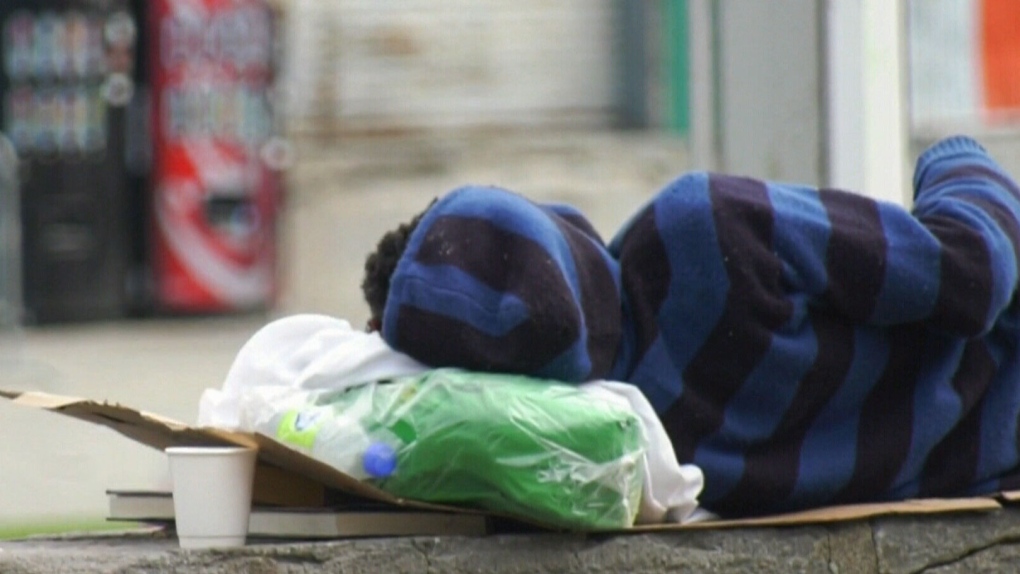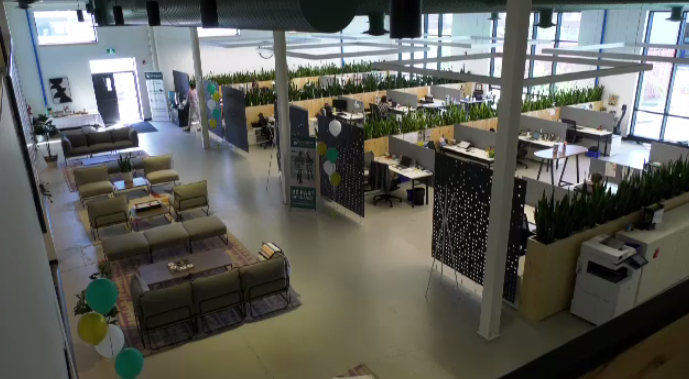The ways you can help someone on the street experiencing a mental health crisis

It’s an increasingly common scene in Winnipeg: an unsheltered person showing clear signs of a mental health crisis, acting erratically, ranting and yelling, lashing out at objects and people around them, and possibly hurting themselves and others in the process.
This unsettling scenario is being seen frequently in the downtown core, on the bus, and in other parts of Winnipeg. And it's a crisis facing the city's marginalized population according to Sharon Blady, founder and CEO of Speak Up Mental Health & Neurodiversity.
"These folks fell a long time ago, and the safety nets did not catch them," Blady said. "There can be disassociation, there can be psychosis going on."
She said the behaviour of people on the streets experiencing a mental health crisis is often dismissed as being caused by drugs, "but even if they are using a substance, it usually comes from some form of self-medication," said Blady.
"They are either trying to bring down a feeling that they are feeling too intensely, or trying to feel something where there's a numbness … its self-medication and it has these other consequences," she added.
Blady said the stigma of homelessness still contributes to the problem.
"There are still strong stigmas against the populations who are under-housed, under-supported in terms of their mental health and neuro-divergence," she said.
It’s an issue faced every day by Turning Leaf Support Services, a non-profit organization that seeks to help those living with mental illness.
CEO Barkley Engel said in his experience, substance addiction and mental health problems go hand-in-hand. "Sometimes they're exacerbated by self-medication, other times they are a way that they can manage the intense pain of the trauma that they’ve experienced," he said.
Among its other mental health support services, Turning Leaf runs an after-hours crisis response unit created to de-escalate these exact situations.
"Last year for sure we've seen an increase in calls for our after-hours team," said Engel. "Most of them pertain to self-medication or addictions; specifically there are overdoses that we're managing at that level."
He said the crisis team is dispatched from a central location and can respond anywhere in the city when people call to report an incident.
Engel said the team carefully assesses the situation when they arrive. "When we're on scene, there's a lot of listening, a lot of scene assessment – what's happening, what is this person presenting with … you cannot rush a moment of crisis intervention."
He referred to a recent incident in which a woman who was overdosing came to their Roseberry Street location for help.
"We're glad she came by the office, she definitely needed the help," said Engel. "But that particular intervention - from start to finish - took six hours. So you have to be prepared to spend time," he said.
 Turning Leaf Support Service's new Roseberry Street space has private rooms for counselling, a kitchen area for people to eat and washrooms with showers for vulnerable people to wash up.
Turning Leaf Support Service's new Roseberry Street space has private rooms for counselling, a kitchen area for people to eat and washrooms with showers for vulnerable people to wash up.
The crisis response team is available only for Turning Leaf clients, and is not meant for the general public.
Manitoba Shared Health does runs a publicly-accessible crisis response centre. Anyone can call the Mobile Crisis Service at 204-940-1781 for help. But a Shared Health spokesperson still recommends calling 911 first if you think there is an immediate danger.
"The immediate action recommended in situations where someone is harming themselves, is experiencing a medical emergency or is posing a danger to themselves or others is to call 9-1-1 and ask for help," said Shared Health in an email to CTV News. "If you feel it is unsafe to approach the individual then do not approach them. Maintain a safe distance and, if possible (and if safe), stay until emergency help arrives."
Engel said the demand for Turning Leaf's services has grown exponentially since the pandemic began.
"There was a bit of a slump at first, and then we saw a pretty significant escalation in reports of the use of substances and mental health crisis," he said.
"The isolation and the lack of access to service because of COVID exacerbated the situation and brought those particular cases to our front door," Engel added.
Blady agrees the pandemic made things worse, as the increased demand on the health-care industry took its toll on Winnipeg's unsheltered population.
"Those things were amped up exponentially while services went down … all of our health care systems were strained," she said.
Blady said anyone trying to help someone in mental health crisis should be cautious. "If somebody's having a psychotic episode, how you approach them or if you approach them can make a difference because they may lash out."
She said one thing you can do in that moment is to scan the environment and see who else is there.
"You could be in a situation where other people are behaving in ways in response to them that may either be aggressive, demeaning, shameful, something else that could be accelerating things," said Blady.
She said it's important to be accepting in that situation. "Nobody's there by choice. We need to lead with empathy, compassion, non-judgment."
Engel said his team has done a good job of filling the gap between medical treatment and law enforcement. "Once we get involved, the risk decreases, they are de-escalated, they don’t require law enforcement engagement."
He said in many cases an ambulance does not need to be called, which saves on resources.
Blady said reducing the number of uniforms involved can help.
"A lot of folks that are in these places have had negative experiences with first responders," Blady said.
She said the focus needs to be put on prevention and helping these people get off the streets.
"What it might cost to house somebody is far less than what it costs if they end up making repeated visits to emergency departments, and there are ambulances being called, and all the other things that we are doing," said Blady.
Engel said it is about removing barriers. "I think the best thing that we do is that we're responsive, so regardless of the time and place, the service that we've got is designed to respond. And that’s a huge part of engaging people that are in crisis.
"They need some resources to access for sure, and calling 311 or 911 is a limited response," said Engel.
He said Turning Leaf has made rubber bracelets for their clients to wear with the appropriate emergency numbers printed on them. "They can show someone to call the number that’s on there, and we can respond."
Engel reinforces that the most important thing to do in that situation is to be understanding. "This is where they're at today, meeting them where they're at and being accepting. That’s our byline at Turning Leaf, unconditional acceptance."
CTVNews.ca Top Stories

'We'll never be the 51st state,' Premier Ford says following Trump’s latest jab
Ontario Premier Doug Ford says Canada will "never be the 51st state," rebuking U.S. President-elect Donald Trump’s latest social media post.
'Why would I box myself in?': Singh on why he won't commit to helping bring Trudeau's gov't down, yet
NDP Leader Jagmeet Singh says U.S. president-elect Donald Trump's looming tariff threat is part of the reason why he's not committing to voting non-confidence in Prime Minister Justin Trudeau's government.
B.C. man drops camera into ocean, accidentally captures 'breathtaking' whale video
Before it turned into an extraordinary day, Peter Mieras says it began being quite ordinary.
Elon Musk comes out swinging against government spending package in early test of his political might
Elon Musk derided a Republican-backed government spending bill that if not passed by Friday night would lead to a government shut down.
Providing MAID to man on day pass from B.C. psychiatric ward was 'unlawful,' family alleges
A 52-year-old man who was provided with a medically assisted death while out on a day pass from a B.C. psychiatric hospital should never have been approved for the life-ending procedure, his family alleges in a recently filed wrongful death lawsuit.
Donald Trump says Canada becoming 51st U.S. state is 'a great idea.' Jean Charest calls the comment a 'wake-up call'
U.S. President-elect Donald Trump is taking aim at Canada once more, saying it would be 'a great idea' to make it America's ‘51st state.'
Fashion influencer Matilda Djerf apologizes following report she created a toxic workplace
A social media influencer has issued an apology after reports that she created a 'work environment filled with fear and psychological pressure' at her company.
Police suspect Utah father killed his wife and 3 kids, wounded son, then killed himself
Five people were found dead in a Utah home after a man apparently shot his wife and four children before killing himself, police said Wednesday. A 17-year-old boy survived but has a severe brain injury.
What's the best treatment for ADHD? Large new study offers clues
Stimulant medications and certain therapies are more effective in treating ADHD symptoms than placebos, a new study on more than 14,000 adults has found.

































